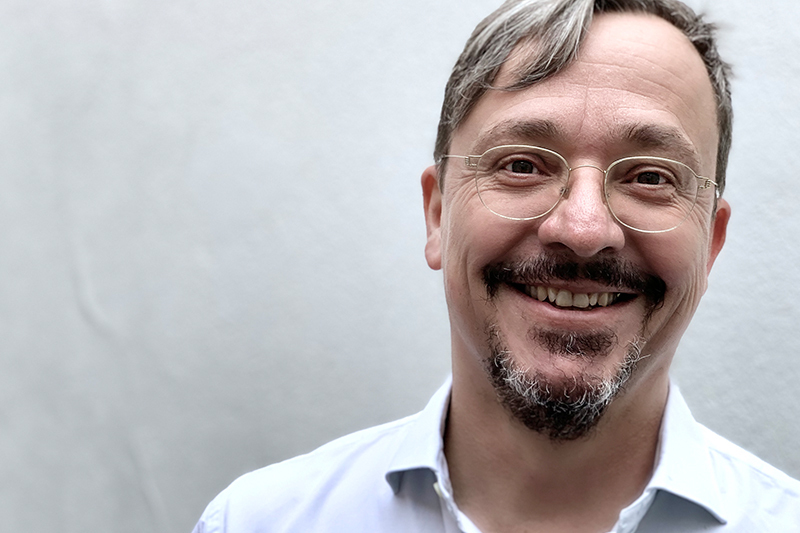News
"People are social learners - all their lives."
[10.02.2025]The Psychology of Digital Teaching and Learning: Prof. Dr. Marcus Specht is now working on this topic at the CATALPA research center.
 Photo: privat
Photo: privat
At the turn of the year, he took over the research professorship "Learning Sciences in Higher Education" at the central institution of the FernUniversität in Hagen. "Among other things, I am looking forward to advancing research on learning with AI," says Specht. "CATALPA offers optimal conditions for this.
From the Commodore 64 to cognitive psychology
Marcus Specht, born in 1967, grew up in the Allgäu region near Lake Constance. He has been interested in technology since childhood. "I programmed games with school friends on my first computer, a Commodore 64. He also played the drums, a hobby he continues today in several bands.
Shortly before graduating from high school, Specht became interested in psychology. "A very important book for me was 'Cognitive Psychology' by J.R. Anderson," says Specht. The American cognitive psychologist became involved early on with intelligent tutoring systems - computer systems that support learners with individualized instructions. Specht was fascinated by the combination of psychology and computer science. "In my second semester, I took the course 'AI for Psychologists' and from then on I started working with programming languages," says Specht. "That had a big influence on me.
My aim is to enable human-centered lifelong learning with AI.
Marcus Specht
Interdisciplinary career
In the decades that followed, his research interests and academic career were consistently interdisciplinary. Marcus Specht's research focuses on learning analytics, AI in education, digital literacy, and computational thinking. He has held various positions in both computer science and psychology. Most recently, he was head of the 4TU Center for Engineering Education. 4TU is an alliance between the Technical University of Delft, the Technical University of Eindhoven, the University of Twente and the University of Wageningen. Specht was also the scientific director of the Leiden-Delft-Erasmus Center for Education and Learning. In addition to his new research professorship at CATALPA, he currently holds the Chair of Digital Education in the Faculty of Electrical Engineering, Mathematics and Computer Science (EEMCS) at TU Delft. He has also recently become Editor-in-Chief of the International Journal of Artificial Intelligence in Education, a CORE A-ranked journal.
Farewell from Leiden-Delft Erasmus Centre
- After more than 10 years at the Leiden-Delft-Erasmus Center for Education and Learning, Marcus Specht is leaving his position as scientific director. A retrospective and an interview with him have been published here.
- The results of the research conducted by the Centre for Education and Learning have been summarized in the publication "Research for Digital Education".
Enhancing learning through technological innovation
Marcus Specht has been closely associated with CATALPA for several years as a member of the scientific advisory board. "His professional expertise and his international network make him an ideal choice for CATALPA, but also for the FernUni as a whole," said Prof. Dr. Stefan Stürmer, Deputy Rector of the FernUniversität in Hagen, when presenting the certificate of appointment. We as a faculty are also very much looking forward to working with him," added Prof. Dr. Andreas Mokros, Dean of the Faculty of Psychology.
Marcus Specht's work focuses on promoting, stimulating and developing learning through technological innovations in teaching. "People are social beings who learn throughout their lives," says Specht. Today, many problems can be solved technically, for example with the help of AI. "My goal is to enable human-centered lifelong learning with AI."
FernUni is ideal for learning and AI research
The FernUniversität in Hagen is an ideal place for research in this area. "Online learning has been part of everyday life here for a long time," he says. "That's why there is a great deal of openness to AI topics and similar future-oriented developments." What makes the FernUniversität special is that it allows research with large learning cohorts. "This is how we achieve results that are scalable nationally and internationally.
The move to the FernUni also brought Marcus Specht closer to his main residence in Bonn - and back to Germany from the Netherlands. "I'm looking forward to using my international experience to make a difference for the German education system," says Specht. He adds that the Dutch education system is very innovative. "I would like to transfer this to the German system and also do research on innovation here."

